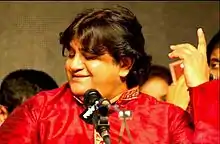Pt. Rattan Mohan Sharma | |
|---|---|
 Rattan Mohan Sharma in concert | |
| Background information | |
| Born | 14 June 1971 Rajasthan |
| Genres | Khayal, Tarana, Haveli Sangeet, Tappa, Bhajan, Rajasthani Folk |
| Occupation(s) | Vocalist |
| Years active | 1999-present |
| Website | rattanmohansharma |
Rattan Mohan Sharma (born 14 June 1971) is an Indian classical vocalist, belonging to the Mewati gharana.[1] He performs classical music forms such as khyal and tarana as well as light classical forms such as Haveli Sangeet, Tappa and Bhajan as well as Rajasthani Folk.[2] He is considered an "A" grade artist on All India Radio.
Early life and training
Sharma was born in Rajasthan to Padma and Mohan Lal Sharma. He is the nephew and a disciple of classical vocalist, PanditJasraj.[3] His affinity for percussion instruments in his youth led Sharma to practice tabla up to the age of 15. Over the years, he has trained under Pandit Jasraj.[4][5]
Career

He belongs to the Mewati Gharana and belongs to the family of vocalists such as Motiram, Maniram, Pratap Narayan, and Jasraj. He has performed in many concerts and festivals in India and abroad.[1] As a playback singer he has performed in the mythological film Dashavatar (2009).
He performs regularly at the classical music festival Pandit Motiram Pandit Maniram Sangeet Samaroh organized by Jasraj.
Awards & Titles
- Shankar Rao Vyas Award
- Pandit Jasraj rotating Trophy
- Mewati Gharana Gaurav Puraskar
- Acharya Varishtha (title)
- Sur Ratna (title)
- Sur Mañi (title)
- IWAF (gharana award)
- Rajasthan gaurav samman
- Marwar ratna
- Badshah-e-Tarana (title by people of Hyderabad)
- Kala Sarathi (by shri shri Ravi Shankar ji)
Personal life
Sharma is married to Ekta Sharma and has a son, Swar Sharma.
Discography
Devotional albums include
|
|
|
References
- 1 2 Ramakrishna, Lakshmi (9 January 2015). "A high five - Tirupati". The Hindu. Retrieved 25 September 2015.
- ↑ S. Sahaya Ranjit (18 September 2006). "Music review: Haveli Sangeet". India Today. Retrieved 25 September 2015.
- ↑ Nair, Jyoti (12 March 2015). "The maestro's magic". The Hindu. Retrieved 25 September 2015.
- ↑ "A custom of culture". The Hindu. 1 December 2004. Archived from the original on 15 January 2005. Retrieved 25 September 2015.
- ↑ "'Hyderabad is my teerth sthaan'". The Hindu. 27 November 2008. Archived from the original on 10 December 2008. Retrieved 25 September 2015.